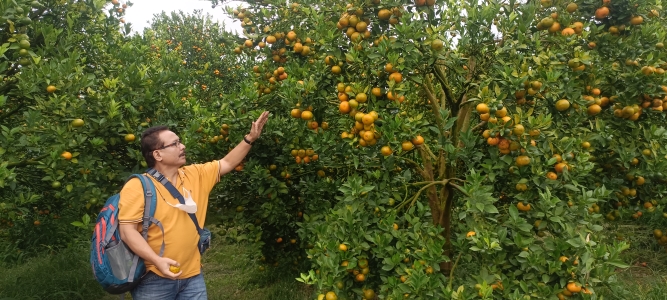Professor IPB University Talks about the Unique Character of Indonesian Fruits

Professor of the Faculty of Agriculture, Prof Darda Efendi said that Indonesia is rich in types of fruits, but only 60 species have become commodities under the guidance of the Directorate General of Horticulture, Ministry of Agriculture. In nature, there are still many things waiting to be discovered, developed, utilized and conserved. This was conveyed in the Pre Orational Press Conference for Permanent Professors, (16/3) which was held online.
He said, Indonesian fruits have various unique characteristics. Some have large seeds and cannot be stored for long, have apomictic seeds (produced from the mother's tissue only/unfathered; so they cannot be bred), reproduce vegetatively, some have three sex types such as papaya, have a juvenile period and have a long life cycle and bear fruit seasonally.
“This makes development, breeding and conservation relatively difficult. This requires a non-conventional approach such as tissue culture. Tissue culture is part of cellular biotechnology that can reproduce seeds/seedlings en masse that are fast, uniform and true to type (same as the parent)," he explained.
He explained, tissue culture can be done in three ways. Namely induction and multiplication of side shoots (from explants that already have meristems); organogenesis (formation of organs from explants that are not meristematic); somatic embryogenesis (formation of an embryo from vegetative tissue).
“Of the three ways, the somatic embryogenesis pathway has many advantages. Namely, it is more efficient, better than meristem culture and organogenesis culture and the resulting somatic embryos already have potential tuna and root candidates," he said.
The most important thing, he added, is that somatic embryogenesis is formed from a single cell so it is very suitable for use as a base explant for breeding.
On this occasion, he also explained about the technology of long term storage (seeds/explants) by cryopreservation (storage at -196 oC in liquid nitrogen). Cryopreservation allows genetic material to be stored long-term without loss of viability and without genetic alterations occurring.
According to him, the cryopreserved material can be in the form of cells, tissues, organs or in vitro cultures (tuna, hypocotyl, callus, embryogenic mass).
Papaya seed is a seed with a short shelf life, cryopreservation is needed as an alternative. From the cryopreservation data of three papaya cultivars (Callina, Caliso and Sukma) from the Center for Tropical Horticultural Studies (PKHT) IPB University, it was found that the protocol and success of cryopreservation depended on the type of papaya," he continued. (Zul) (IAAS/AMR)


